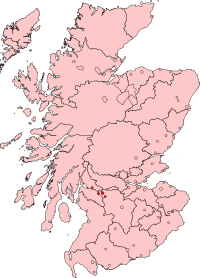Clyde Burghs (UK Parliament constituency)
Clyde Burghs, also known as Glasgow Burghs, was a district of burghs constituency of the House of Commons of Great Britain (at Westminster) from 1708 to 1801 and of the House of Commons of the United Kingdom (also at Westminster) from 1801 to 1832. It elected one Member of Parliament (MP).
| Clyde Burghs or Glasgow Burghs | |
|---|---|
| Former District of burghs constituency for the House of Commons | |
 | |
| Subdivisions of Scotland | Lanarkshire, Dumbartonshire, Renfrewshire |
| Major settlements | Dumbarton, Glasgow, Rutherglen, Renfrew |
| 1708–1832 | |
| Replaced by | Glasgow constituency Kilmarnock Burghs |
| Created from | Dumbarton Glasgow Renfrew Rutherglen |
Creation
The British parliamentary constituency was created in 1708 following the Acts of Union, 1707 and replaced the former Parliament of Scotland burgh constituencies of Glasgow, Dumbarton, Renfrew and Rutherglen.
Boundaries
The constituency consisted of parliamentary burghs along the River Clyde and the Firth of Clyde: Dumbarton in the county of Dumbarton, Glasgow and Rutherglen in the county of Lanark, and Renfrew in the county of Renfrew.
History
The constituency elected one Member of Parliament (MP) by the first past the post system until the seat was abolished for the 1832 general election.[1] [2] [3] [4] [5]
When the district of burghs constituency was abolished in 1832 the Glasgow parliamentary burgh was merged into the then new two-member Glasgow constituency. The Dumbarton, Renfrew and Rutherglen burghs were combined with Kilmarnock burgh and Port Glasgow burgh in the then-new Kilmarnock Burghs constituency.
Members of Parliament
| Election | Member | Party | |
|---|---|---|---|
| 1708 | Robert Rodger | ||
| 1710 | Thomas Smith | ||
| 1716 | Daniel Campbell | ||
| 1727 | John Blackwood | ||
| 1728 | Daniel Campbell | ||
| 1734 | William Campbell | ||
| 1741 | Neil Buchanan | ||
| 1744 | John Campbell, Marquess of Lorne, later 5th Duke of Argyll | ||
| 1761 | Lord Frederick Campbell | ||
| 1780 | John Craufurd | ||
| 1784 | Ilay Campbell | Pittite | |
| 1790 | John Craufurd | ||
| 1790 | William McDowall | ||
| 1802 | Alexander Houstoun | ||
| 1803 | Boyd Alexander | ||
| 1806 | Archibald Campbell | Tory | |
| 1809 | Alexander Houstoun | ||
| 1812 | Kirkman Finlay | Tory | |
| 1818 | Alexander Houstoun | ||
| 1820 | Archibald Campbell | Tory | |
| 1831 | Joseph Dixon | Whig | |
References
- "Glasgow Burghs". History of Parliament Online (1690-1715). Retrieved 27 March 2019.
- "Glasgow Burghs". History of Parliament Online (1715-1754). Retrieved 27 March 2019.
- "Glasgow Burghs". History of Parliament Online (1754-1790). Retrieved 27 March 2019.
- "Glasgow Burghs". History of Parliament Online (1790-1820). Retrieved 27 March 2019.
- "Glasgow Burghs". History of Parliament Online (1820-1832). Retrieved 27 March 2019.